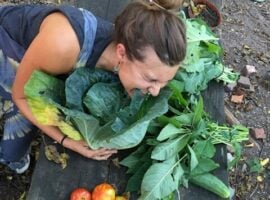Tallahassee, Florida, the capital city of the Sunshine State, boasts a nearly 12-month growing season, rich soils, and a climate that accommodates cool and warm weather crops. It’s a place where citrus abounds during bitter winter months and fresh juicy tomatoes hang loose in the heat of summer. Its home to papaya, mangoes, collard greens and broccoli, and with so much variety, some would even call it a food paradise.
And, yet, like most cities in the United States, Tallahassee’s food environment has been shaped by the global industrial food system and its readily available, low cost, and any-season variety of fruits, vegetables, and packaged foods.

The city grew rapidly after the 1960s. Once industrial agriculture was in full swing, it wasn’t long before Tallahassee’s urban identity was largely secured, pushing food production to the periphery. As grocery stores made their homes in whiter and wealthier neighborhoods, residents in neighborhoods like Frenchtown, Tallahassee’s oldest neighborhood, were left to purchase food in gas stations and convenience stores.
Frenchtown, a small historically Black community, is home to engaged community members and a rich history of Black entrepreneurship, artistic expression, and agriculture. Taking matters into their own hands, community leaders harnessed their history and local food movement as a catalyst for change in 2012, launching the Frenchtown Neighborhood Improvement Association (FNIA), a community-based nonprofit focused on improving quality of life for Frenchtown residents. FNIA, community leaders, neighborhood growers, farmers and entrepreneurs organized to start the Frenchtown Heritage Farmers’ Market, operating seasonally on Saturday mornings. Within two years of opening, the market grew and moved to a now permanent location, the Frenchtown Marketplace & Heritage Hub, adding a network of 12-17 local farmers and vendors to the local economy.
Community leaders knew that it wasn’t enough to simply open a market, they needed to create a space for their community to cook, test their trade, and learn new skills. Today, the Frenchtown Marketplace & Heritage Hub offers programs that help level the barriers to entrepreneurship and craft. Small farmers and food-based micro-enterprises, most of whom represent low resourced populations, now have access to support, training and services that they need to conduct a successful commercial operation. In addition to affordable facilities access, KitchenShare was created to provide training in equipment operation, food safety, and product development in a certified kitchen. The commercial kitchen has been outfitted with a wide array of equipment to encourage production variety, and up to three stations are available for simultaneous operation. With access to a state-of-the-art facility, aspiring caterers, sauce makers, and bakers have the chance to let their creativity and businesses flourish.
To learn more about Frenchtown’s Marketplace & Heritage Hub and its grassroots effort to improve food access and their local economy, click here.
Want The ROOT Report in your email? Sign up today at www.whyhunger.org/TheROOTReport






